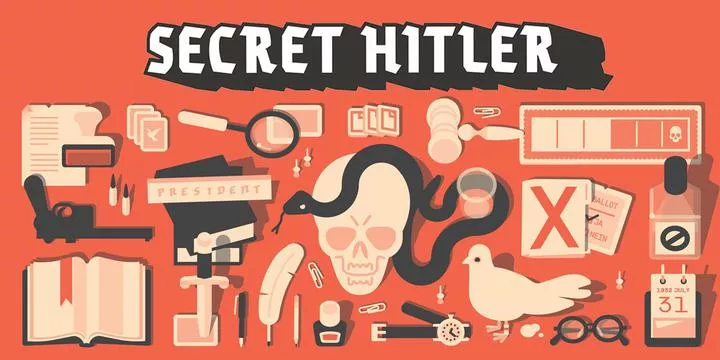For this critical play, I chose to play “Secret Hitler” by Goat, Wolf, & Cabbage LLC. The game is available as a board game and an online game, but I played the board game.
In this critical play analysis, I will argue that “Secret Hitler” creates an immersive and engaging social deduction experience by fostering a tense atmosphere of trust and deception. Players stay invested regardless of their assigned role because of the pervasive uncertain dynamic that arises from the mechanics.
The target audience of “Secret Hitler” is really anybody who enjoys social deduction, bluffing, and hidden role games, but it is most likely more geared towards adults and a more mature audience due to its high-level political and historical aesthetic. Children may not be the appropriate audience, but all others would likely enjoy.
“Secret Hitler” can be played with 5 to 10 players, with the ideal player count being about 7 or 8 to allow for a good number of fascists against the liberals without being too overwhelming (with 7 or 8 players, there are 3 fascists with one being Hitler, and the rest of the players being liberals).
In “Secret Hitler,” there are several formal elements that significantly influence the gameplay experience. One such formal element is the presence of the policy cards, which both the Liberals and the Fascists use to progress their team’s objectives. These policy cards are used hand-in-hand with the game board, which serves as a boundary, to track progress. Both of these elements force players to make strategic, calculated decisions while also working within the constraints of the game to keep everyone focused. The presence of both policy cards (resources) and game board (boundaries) further immerses the player in an overarching objective that makes the social deception and attacks much more heightened. If these elements were removed, it would significantly affect both the pacing and the tension of the game by making each decision more or less influential.
Another one of the most important formal elements is the central conflict between the Liberals and the Fascists. The game is driven forward by this constant clash from both sides, heightened by the fact that practically nobody knows who is fighting for what team. This is what is at the core of the social deduction and the reason for all the lying, bluffing, and paranoia. The distribution of players is of utmost importance for this element, since having more or less of each team inherently shifts the balance of power and the difficulty of deduction.
“Secret Hitler” presents multiple different kinds of fun, which is what makes it such a dynamic and engaging game. The game presents fun in the form of challenge, expression, fellowship, and fantasy.
The challenge aspect of the game comes from the player’s need to deduce the roles of others while keeping their role a secret, requiring strategic thinking and manipulation. The mechanics of the game board and policy cards help facilitate the need to overcome the challenge presented by the game.
The expression aspect shines through with the player’s ability to express themself through their decisions, accusations, and roles, which leads players to take on different personalities or exaggerate an aspect of themself to win others over. After all, isn’t it fun to be allowed to lie and cheat in a socially acceptable way?
The fellowship aspect of the game comes from the need for each team to work together to elect their party. This promotes player interaction and communication, which are necessary to the game, allowing individuals to engage in discussions and accusations.
Finally, the fantasy side of the game comes from the historical theme and hidden roles that allow the player to partially step into an alternate reality where they can imagine themselves as political leaders in a tense, high-stakes situation.
The other types of fun are also present to some degree, but they don’t dominate the game as much as these four do. By having such a wide array of types of fun, the game is constantly fresh and provides something for everyone.
While I think this game is nearly excellent as-is, there are a few changes that could be made to make the game even more fun, such as making the theme something more contemporary or introducing new roles or abilities as we did in class with Werewolf.
Overall, the game plays into human nature excellently and creates a dynamic social deduction experience that has high replayability and fosters connections between friends and strangers alike.



